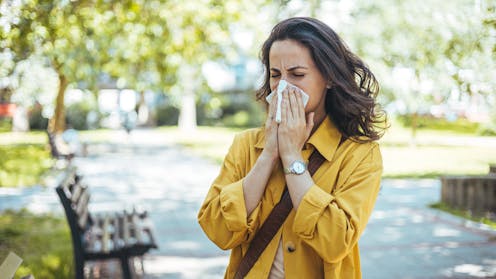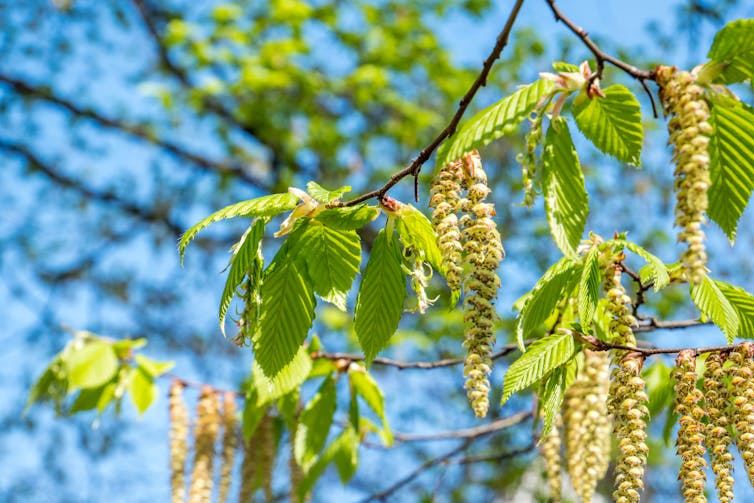Source: ForeignAffairs4
Source: The Conversation – UK – By Heba Ghazal, Senior Lecturer, Pharmacy, Kingston University

Around 25% of hay fever sufferers in the UK are allergic to birch tree pollen. This means that for a good chunk of the population, the arrival of spring and summer means sneezing, itchy eyes, blocked sinuses and days spent indoors avoiding pollen. But the recent approval of a new drug could mean relief from these symptoms for thousands living in England with severe allergies to birch pollen.
Birch pollen is the most common allergy-causing tree pollen across most parts of Europe and the UK. Pollen from birch-related trees including alder, hazel, oak, hornbeam and beech trees can also trigger symptoms – ranging from coughing, congestion and sneezing to itchy, watery eyes.
Symptoms are usually at their peak in April and May, but can sometimes last up to six months – from January to June. Research investigating UK pollen trends has also found that climate change – specifically rising temperatures – is making the UK birch pollen season longer and more severe.
Birch pollen allergies are triggered when the immune system mistakes pollen proteins for harmful pathogens. This causes the immune system to make immunoglobin E (IgE) antibodies – a type of immune defender that attaches itself to immune cells.
This means that the next time the body is exposed to the allergen, the IgE antibody will tell the immune cells to release the immune chemicals histamine, leukotrienes and prostaglandins to destroy the perceived pathogen. Histamine acts within seconds to cause itching, sneezing, swelling of blood vessels and mucus production.
New treatment
The standard treatment for birch pollen allergies include oral antihistamine and corticosteroid nasal sprays. However, a UK study found that even with both, only 38% reported good symptom control. That means up to 62% of people spend birch pollen allergy season fighting to control their symptoms.
But the National Institute for Health and Care Excellence (Nice) has just approved a new oral treatment for adults with severe allergies to birch tree pollen. The tablet, called Itulazax (betula verrucosa), is a type of immunotherapy.
Immunotherapy differs from standard allergy medications by targeting the root cause. The idea is simple: treat the allergy with the allergen that causes it – in this case birch pollen extract. Repeated exposure to tiny, controlled doses of the allergen then trains the immune system to build tolerance over time. The goal with immunotherapy is to change how the body reacts to the allergen entirely rather than just ease the symptoms.

Animaflora PicsStock/ Shutterstock
Itulazax raises immune tolerance to birch pollen by reducing the number of IgE antibodies the immune system makes when exposed to birch pollen and increasing the number of protective antibodies the body makes. This significantly reduces major pollen allergy symptoms and prevents the body from mounting an immune response against birch pollen in the future.
The treatment is specifically approved for adults with severe birch pollen allergies who have not responded to regular allergy treatments. To qualify for treatment, a confirmed diagnosis is required through a skin prick or blood test showing a reaction to birch-related trees.
Clinical studies show the treatment is generally safe, with the most common side-effects being mild to moderate itching in the mouth and throat irritation – both linked to how it is taken under the tongue. As such, the first tablet must be taken under medical supervision – with at least 30 minutes of monitoring for immediate side-effects.
Though the treatment is effective, it’s not a quick fix. To see results treatment should start at least 16 weeks before the birch pollen season begins and continue through the season. So for people with severe symptoms, this means they may need to start taking the treatment in November. The course also lasts around three years.
Still, for the thousands of people in the UK who experience birch pollen allergies, this new treatment offers a solution for symptoms that can range from annoying to debilitating. The approval of this immunotherapy also offers hope that immunotherapies to treat other types of hay fever will someday be approved.
![]()
Heba Ghazal does not work for, consult, own shares in or receive funding from any company or organisation that would benefit from this article, and has disclosed no relevant affiliations beyond their academic appointment.
– ref. Hay fever: new immunotherapy approved in England for people with severe birch pollen allergies – https://theconversation.com/hay-fever-new-immunotherapy-approved-in-england-for-people-with-severe-birch-pollen-allergies-263286
